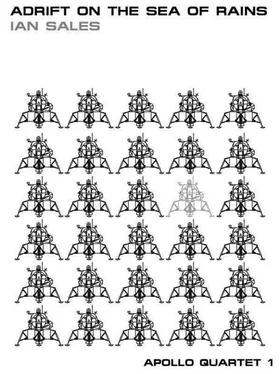Peterson rises from his desk and gestures for Scott to take his seat.
There is a protocol to these handovers, but they can only say, Nothing to report, so many times, in so many different ways. Scott silently takes Peterson’s chair, and it’s as though what little personality the XO possesses drains from him. As Peterson watches, the man turns into an automaton, and sits there blank and unblinking.
Peterson leaves him to it. They all have their own ways of dealing with the situation. Deep inside each of them, hope has been eroded away to a tiny nub, as useless as an appendix. Peterson loses himself in the lunar landscape. McKay locks himself in his room and listens to mournful country music, as if their misery renders his own smaller and more manageable. Scott has put away his personality, consigned it to some corner of his mind where it cannot be battered and bruised by their slow descent into despair. Curtis reads, working his way obsessively through every manual and technical document in the base. Kendall has his torsion field generator, the Bell, whose arcane workings he claims to understand more with each passing week.
The others—Alden and Fulton, Bartlett and Neubeck—each have their own methods to counter the madness. For now, those four are hidden away somewhere—perhaps in their own rooms, in the gym, the workshop. Peterson doesn’t know and he doesn’t want to know. He considers visiting Kendall in his lab, but he doesn’t like the man and the feeling is mutual. He makes his way down the corridor to his own room, feeling like he’s walking on tiptoe though the soles of his feet adhere strangely to the carpet.
He reaches his room, slides open the flimsy door, stretches out on his bunk, and thinks black thoughts. Every now and again, his breath seems to catch in his throat, as if expecting vacuum. These brief panic attacks have become increasingly common, are now waking him several times each night. Only in his spacesuit, wrapped in its protective embrace and soothed by the whirr of its pumps and fans, does he feel peace. The polycarbonate helmet, with its LEVA, is his window on the world, and gives him distance from the lifeless landscape. He needs to be able to divorce himself from his surroundings, to put up barriers—physical and emotional and mental—between himself and the world. Without that, he thinks he might die. He refuses to invest too much emotion in the Bell. For months now, it’s taken them to one dead Earth after another.
Yet still he believes escape is possible.
Peterson had only three weeks left of his tour when Kendall arrived at Falcon Base, although he’d known of the man’s arrival for several weeks in advance, and he’d repeatedly argued the Moon was not the place for a scientist, that if his experiments were so vital to national defence they needed to be somewhere secure, the Moon’s only defence being its remoteness. There was little stopping the Soviets launching one of their Proton boosters, sending a warhead all the way to Mare Imbrium and creating a new crater right where Falcon Base lay buried in the wall of Rima Hadley. After all, the situation was getting real bad down there, Peterson could see that even from his distant eyrie—no, nothing in orbit yet, no rain of ICBMs, horizon to horizon, rocketting East to West, immediately answered with a retaliatory launch, speeding West to East. No ten minute warning, no classrooms silent but for the whimpering of kids huddled beneath their school-desks, no slamming hatches echoing across yards as people waited for the end in inadequate fall-out shelters—it had not gone that far yet; but NORAD had been at Defcon 2 for the last five months, and there was fighting in Anatolia between Soviet forces and NATO-backed Kurdish rebels, and it was only a matter of time before the rest of NATO pitched in and the battle spread north along the Iron Curtain. Vandenberg claimed they’d spot any warhead launched on TLI, and they’d give Peterson plenty of warning, which didn’t answer what they’d do at Falcon Base after an alert—hide in the Apennine Mountains? in the depths of Archimedes Crater? learn to breathe vacuum and live off the regolith? There were a dozen men at the base but only a single ALM with an ascent stage—which could lift four into orbit and, now they were using the new Block IV 5-man command modules, they could get those four back to Earth in one spacecraft. But it didn’t take a rocket scientist to see the math didn’t add up. For all those hours Peterson had spent in classrooms at JSC and the Cape and Vandenberg, learning his way round the Apollo spacecraft and Falcon Base, he’d travelled to the Moon as much on faith as on Aerozine 50 and dinitrogen tetroxide, on an unshakeable conviction that if it all went SNAFU on the Moon, Vandenberg would do their damnedest to get every man home. Once he was on Luna, of course, he saw the error of his ways—if it broke on the Moon, you fixed it on the Moon, you couldn’t send it off to the repairman a quarter of a million miles away—if you didn’t fix it, you died. That wasn’t the case for the equipment they sent with Kendall for his experiments; if that broke there’d be a nasty bill for the Pentagon, but no one was going to find themselves sucking vacuum, which was a relief, except… The Bell was a Saturn V launch all its own, a LM Truck that could have, and should have, carried supplies—though they had close to two years’ worth on hand in Falcon Base. The one hundred kilowatt SP-100 nuclear reactor was good for twenty years, and they recycled their air and water so effectively both would last them years too; but food, that was the problem, if it could be called food, all freeze-dried or flash-frozen and about as appetising as a Pan-American economy class meal consumed somewhere over the Atlantic in a Boeing 2707 SST. As commander, Peterson felt it incumbent on him to be there to see Kendall land, so he was outside in his spacesuit, with lunar dust all over his boots and shins, as the ALM came hurtling over the horizon, the most ungainly flying craft he had ever seen and each time he saw it in flight the same thought struck him anew. As it approached, it pitched up and began to descend, throwing out a pancake cloud of grey dust, and it all happened in complete and utter silence, an absence of noise broken only by the steady hum of the fans and pumps of his PLSS, and not the rocket’s red roar his eyes told him he should be hearing. They got Kendall out of the ALM—he’d bought Alden and Neubeck with him, and he needed their help getting prepped for EVA and then moving about in the one-sixth gravity—and Peterson knew with the sort of sinking feeling brought on when reading orders written by some asshole with no situational awareness, he knew they’d skimped on Kendall’s training and the man was going to be a liability. Then the LM Truck flew over the horizon at two hundred feet, pitched over from twenty degrees to vertical, and began its computerised descent on its invisible flame, and, sitting on its cargo platform, was some bell-shaped thing that looked so unlike anything Peterson had ever seen before, he knew it had to be Kendall’s. When he later found out what the Bell was, he wondered just how bad it was on Earth, just how desperate was the Pentagon. This was ultra-deep black, not even the President’s advisors knew, but Vandenberg had to tell Peterson something, especially when he saw the small swastika and eagle embossed on the Bell, and Kendall later admitted the device was over forty years old and had been discovered in a Nazi underground facility in Silesia at the end of the Second World War. Kendall himself had been working on it for the last twenty years, mostly up at Montauk on Long Island, with the surviving members of the Project Rainbow team, who had apparently done weird shit with a destroyer in Philadelphia in 1943. It was Kendall’s contention the “torsion field generator” could only fulfil its potential in vacuum, so the Pentagon had moved his entire project, lock, stock and Bell, to the Moon, even though he’d never wanted to come in the first place. And Peterson gazed at this professor of exotic physics, a man who made Tesla look like a high school science teacher, and then looked out the window in the lab at the Bell sitting in its framework in the bottom of Rima Hadley, all a-glow violet, and he thought, he was here on the Moon and it had all turned into goddamned science fiction.
Читать дальше











![Edward Ellis - Adrift on the Pacific - A Boys [sic] Story of the Sea and its Perils](/books/753342/edward-ellis-adrift-on-the-pacific-a-boys-sic-s-thumb.webp)
